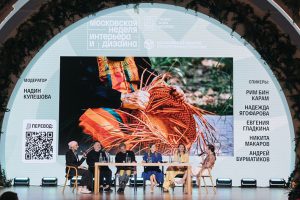SHARJAH / WAM
Bridging Emirati heritage with global design innovation, the Irthi Contemporary Crafts Council (IRTHI) proved to be a pillar of cultural dialogue and artisanal excellence at the Moscow Interior and Design Week 2025 (MIDW), which was held from May 22 to 25, 2025. Within the renowned Manezh Central Exhibition Hall in Moscow, IRTHI’s participation underscored its mission to
preserve tradition while championing sustainability and women’s empowerment, positioning Sharjah’s craft legacy at the heart of contemporary design conversations. Commenting on their participation, Reem BinKaram, General Director of IRTHI stated, “Guided by the vision of HH Sheikha Jawaher bint Mohammed Al Qasimi, the Chairperson of Irthi Contemporary Crafts Council, we practise and promote craft as a tool for social development, cultural diplomacy, and innovation; all of which are evident in the collections we have brought to Moscow.”
“We have been deeply moved by the overwhelmingly warm reception from the Russian people, whose enthusiasm to engage with our heritage-driven initiatives reflects a shared passion for cultural dialogue and artisanal excellence. It is an honour for Irthi to be among the very first entities to lead with such a prominent presence at this gathering, positioning our platform as a focal point of the event. We view designers as collaborators and creators in equal measure, and they serve as the link between ancestral knowledge and contemporary expression,” BinKaram reflected.
As an attraction to the thousands of attendees to the 4-day event, and the only pavilion from the MENASA region, IRTHI’s curated booth captivated visitors and design professionals with immaculate Emirati craftsmanship and modern aesthetics. The display featured collections from the council’s cross-cultural collaborations between local and regional artisans and global designers, including pieces that reimagine palm frond weaving (sa’af), intricate embroidery (talli), and sustainable materials like recycled metals and natural dyes.
The pavilion’s emphasis on sustainability and tradition resonated deeply, and visitors
explored how centuries-old practices, such as resource-efficient dyeing and zero-waste palm weaving, align with modern eco-conscious values. By framing these crafts as premium design solutions, IRTHI challenged perceptions, proving that tradition holds timeless relevance in luxury interiors.
IRTHI’s thought leadership was also highlighted through their participation in two insightful panel discussions. The first, “Reinvesting in Heritage,” featured Reem BinKaram, IRTHI’s General Director, alongside Russian heritage experts and designers.
BinKaram highlighted IRTHI’s initiatives to revive endangered crafts through vocational training and global partnerships, saying “At Irthi Contemporary Crafts Council, we believe restoring heritage crafts is about creating living, evolving traditions; not just preserving relics of the past,” she asserted, citing collaborations that empower women artisans to reinterpret traditions for international markets. BinKaram also emphasised IRTHI’s success in creating economic opportunities for over 1,000 women across the MENASEA and Central Asia regions. “By linking our local artisans with designers from London to Milan and beyond, IRTHI fosters a creative exchange where ancestral skills meet contemporary demand.” This approach, she noted, ensures crafts “thrive as notable contributors to global design economies.” In the second panel, “Nature is Within Four Walls,” IRTHI’s Head of Marketing, Aisha Al Harmoodi, joined sustainability leaders and manufacturers to explore design’s ecological role. Al Harmoodi detailed how IRTHI’s use of locally sourced materials; including palm fibers, camel wool, and natural pigments; embodies a profound connection to the UAE’s landscapes and historic culture. “Our crafts are realised through an intimate dialogue with nature,” she explained. “They teach us that sustainability is far more than a trend and represents an important legacy we can all appreciate and respect.”
She reflected through the example of IRTHI’s Bidwa project, where Bedouin weaving techniques inspire modern home textiles, reducing environmental impact while preserving cultural identity. Al Harmoodi’s insights aligned with global shifts toward biophilic design, positioning IRTHI as a leader in culturally rooted sustainability. IRTHI’s participation at MIDW 2025 reaffirms its role as a champion for cultural preservation and female empowerment; and demonstrates that cultural heritage, when nurtured innovatively, can shape sustainable, inclusive futures.
 The Gulf Time Newspaper One of the finest business newspapers in the UAE brought to you by our professional writers and editors.
The Gulf Time Newspaper One of the finest business newspapers in the UAE brought to you by our professional writers and editors.
